#modding advice
Explore tagged Tumblr posts
Text
I'd really love to fix The Sims 2 Holidays Mod but I can't figure it out😖
I really love the concept of Piqiwi's holiday mod but it has quite a few bugs unfortunately.
I successfully managed to fix sims getting paid for days they wouldn't have been working thanks to @nopke.
And, @jellymeduza implemented a workaround for the problem that it causes the walk to work interaction to be missing completely.
But it has more problems I haven't been able to resolve yet.
From my experience, once a holiday has happened, the sims work schedule will never actually restart, so even on a non-holiday day, there'll be no 'sim needs to be at work in one hour' and the carpool will never show, not until I force off-world errors with the batbox.
Another annoyance, especially with the community time project, is that if the sim is off lot on a holiday at the time they'd usually get paid, they will never get their holiday work pay.
Who else uses this mod? Who else has experienced these problems? Does anyone know how to fix them or have any ideas about how to?
#the sims 2#sims 2#ts2#sims 2 modding#sims 2 mods#piqiwi#sims 2 holidays#holidays mod#modding help#modding advice
21 notes
·
View notes
Text
Writing a Schizophrenic Character: Everything But Hallucinations
Plain text: Writing a Schizophrenic character: Everything But Hallucinations
Hey! Mod Bert here.
So: you’ve decided to write a character with schizophrenia or schizoaffective disorder (there are other disorders on the schizophrenia spectrum but I will be focusing on these for today)
You’ve done it, you have their hallucinations and maybe even delusions picked out. Maybe they are one of many who experience auditory hallucinations or maybe they also have visual hallucinations or a combination. Maybe they have olfactory hallucinations as well. They may have persecutory delusions or delusions of reference or something like Cotard’s delusion or clinical lycanthropy. Awesome, you’ve done it!
What, I hear you say? What do you mean that’s only 2 of the 5 components needed to be diagnosed with schizophrenia? What do you mean, you don’t need to hallucinate at all to be schizophrenic?
What Goes Into a Diagnosis of Schizophrenia
Plain Text: What goes into a diagnosis of schizophrenia
Not a lot of people realize there’s more to schizophrenia and schizoaffective than just hallucinations or delusions. There are 5 diagnostic criterias that are needed for schizophrenia, and only 2 of the 5 are needed for a month, with larger symptoms happening for six months or more. Let’s get into it.
Delusions
Hallucinations
Disorganized speech or thinking*
Disorganized or unusual motor behavior (catatonia)*
Negative symptoms (avolition, anhedonia, flat affect)*
I’m going to focus on disorganized speech/thinking, catatonia, and negative symptoms.
Disorganized Speech/Thinking
Plain Text: Disorganized Speech/Thinking
Schizophrenia and related disorders are often called “thought disorders” for a reason. Speech and thinking can be extremely affected, and for people like me this can be one of the first and most striking examples of an episode coming. Some people will always have disorganized symptoms that will flare during episodes. A myth is that schizophrenia can be indistinguishable with medicine: most people will have some level of symptoms even during moments of peace or “remission”. More on remission later.
So, disorganized speech. Some examples are: word salad (schizoaphasia), thought blocking, poverty of speech (alogia), pressurized speech, clanging, and echolalia.
Word salad: a combination of words that do not make sense together. Often called schizoaphasia for its similarity to jargon in Wernicke’s aphasia, this is instead a disconnection with the brain and not due to damage to the language part of the brain.
(Example: the salad would be yellow in the fat cow).
Thought blocking: A severe loss of thought, often paired with connecting two trains of thought that are not connected
(Example: I went to the………Do you like grapes?)
Poverty of speech: A lack of organic responses to speech or organically speaking, it can be severe enough that a person only responds to questions or in one word responses. Can also happen in severe depression.
(Example: Person A: Did you do anything fun today?
Person B: Yes.
Person A: Oh, what did you do?
Person B: Store
Person A: How was it?
Person B: Fun)
Pressurized speech: A sort of frenzied way of speaking associated with psychosis or mania.
Clanging: Connecting phrases together because of what they sound like instead of meaning
(Example: I went bent tent rent).
Echolalia: Repeating word’s and phrases. Commonly also associated with Autism Spectrum Disorder.
(Example: Person A: I went to the store.
Person B: To the store.)
These are not the only examples but they are some ones I thought I'd highlight, either because they’re well known or I have experience with them, or because they’re famously thought of with other disorders as well and I wanted to point out how things overlap.
Personal experience: I had severe alogia for the duration of my last and worst episode. People thought I was mad at them because of the clipped way I spoke and the lack of really speaking. It got me in a lot of trouble. I didn’t realize what I was saying was different or weird (I have the least insight when it comes to my speaking patterns affected by my schizoaffective, meaning I can’t hear any difference and all of this is from repeated conversations with my mom, who was my caretaker for a bit and knows the most about my speech and what it means). The best solution was talking with people and being honest and educating myself and others. I don’t know about others, but I couldn’t have used AAC at that time.
Catatonia
Plain text: Catatonia
Fun fact: catatonia means unusual motor behaviors! Any unusual motor behaviors mean catatonia. This includes what we think of when we think of catatonia in schizophrenia (inability to move) as well as the opposite (being unable to stop moving) as well as strange movements and ways of holding and moving the body! Catatonia in the DSM-5 includes 3 or more of these 12 behaviors:
-Agitation unrelated to external stimuli
-Catalepsy
-Echolalia
-Echopraxia
-Grimacing
-Mannerism
-Mutism
-Negativism
-Posturing
-Stereotypy
-Stupor
-waxy flexibility
I have some experiences with catatonia-like symptoms but since they were never identified as such I’ll skip those for now. I will say that catatonia is a symptom that can happen in many disorders besides schizophrenia as well.
Negative Symptoms! Yay!
Plain text: negative symptoms! Yay!
So a positive symptom (Hallucinations or delusions) are symptoms that add something to reality or a person. Negative symptoms are symptoms that take away. There are 5 A’s:
-Alogia (Again, poverty of speech, our favorite)
-Avolition (Lack of energy and motivation)
-Affect (Blunted affect, or a flat way of speaking)
-Anhedonia (Lack of pleasure in things that used to bring you pleasure, often thought of with depression)
-Asociality (Lack of interest in social events and relationships)
There are also often cognitive changes including thinking and memory, information recall, understanding, and acquisition, and so forth.
Schizophrenia and schizoaffective often (but not always) happen with what’s called a prodromal period. This period can be months to years (mine was a little less than a year) and mainly consists of negative symptoms. Slowly, positive symptoms are added. There are thought to be stages to schizophrenia including prodrome, active phases, and remission.
I’ll talk about that a little for a second because I’m currently in remission and no one knows what that means. I was diagnosed with schizoaffective depressive type in January 2021. As of February 2024, I no longer qualified to be rediagnosed because my symptoms were strongly under control and no longer severe enough to qualify for a diagnosis. They also didn’t distress me or impact my daily life severely. Day to day now I still have mild symptoms and take my antipsychotics (trying to go off them have made it clear that I still have some symptoms I choose to keep medicating) but I haven’t had a delusion in 2 years and been hospitalized in 3. There’s always a possibility of another episode but I work with my team to keep myself one step ahead if that happens.
What I want from a character with schizophrenia
Plain Text: What I want from a character with schizophrenia
Alright the writing advice part. What do I want from a character with schizophrenia or schizoaffective (which is schizophrenia plus either depression or bipolar).
-Characters with caregivers.
-Characters using coping strategies (recording hallucinations to tell if theyre hallucinations, taking medication, having service animals that greet people so they know if they’re a hallucination, using aids for the cognitive symptoms like sticky notes and organizational tools)
-Characters who know other characters with their disorder, either online or in support group or through running in similar circles
-Characters having autonomy
-Characters who aren’t the killer or horror victim. I know it’s cool to have the schizophrenic protagonist in horror, and I love horror, but I don’t want to read about the horror being symptoms the whole time
-Characters who are in magical scenarios, who are in fantasy and sci-fi. The schizophrenic princess and the schizoaffective robot technician aboard the spaceship.
-Medication and hospitalization treated casually. Sometimes we need higher care. That’s morally neutral
-Characters with negative symptoms and speech symptoms.
-Characters with catatonia!
-Characters with other disorders as well
-characters with side effects from medicine treated casually
-Characters with cognitive symptoms
Thank you for reading this incredibly long thing! Happy writing!
3K notes
·
View notes
Note
Hey, I found a beanie boo that I liked the design of but I can't stand those giant uguu eyes. Do you think it would be possible to replace them with smaller safety eyes akin to the old beanie babies? If yes, do you have any advice?
I was gonna answer this in a normal way, but then I got curious about trying it for myself and thought I might as well demonstrate!
So, I went and picked up a guy from the supermarket. The selection there was pretty barren today but I found a decent test subject:
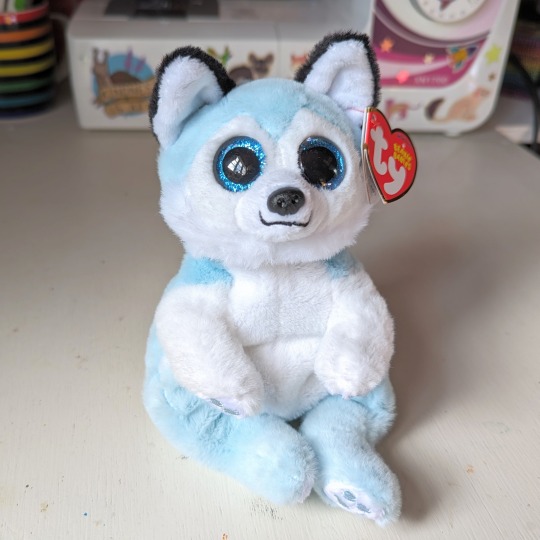
Eye replacement procedure below!
(First of all, to my friend who loves beanie boos, I am so sorry for this lmao)
So! First I opened up the closing seam on his back. However, I found an extra mesh barrier inside! Clearly this is to prevent bean escape since this is the most likely seam to accidentally pop open through play. This would be a bit annoying to work around so I just sewed it back up and went in the back of the head instead…
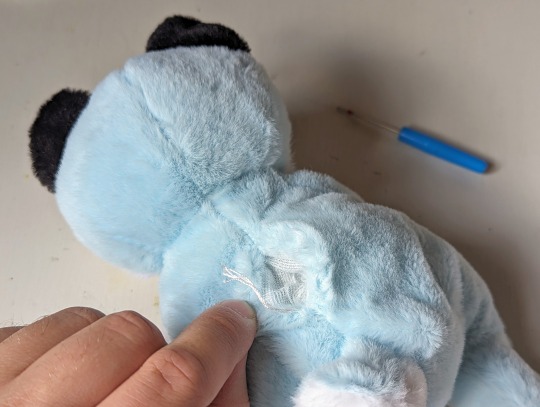
Opened and unstuffed the head…
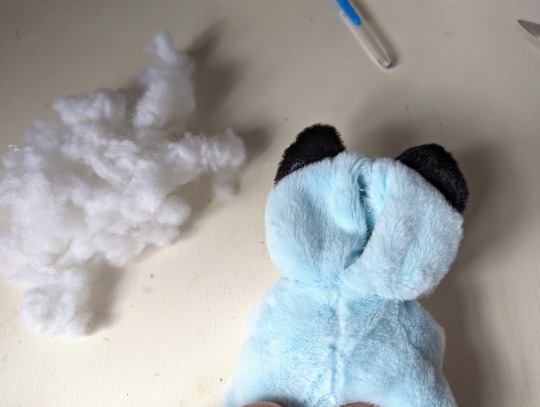
…And turning it inside out to get to the backs of the eyes. Whoa, these plastic washers are the biggest I’ve ever seen!! Cutting through them will take some work!
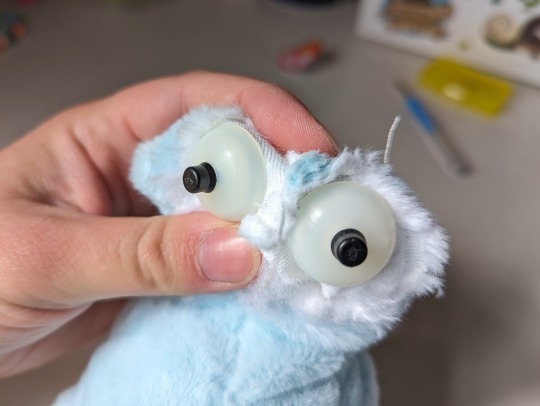
Please be very careful of your fingers cutting through these!! Be careful not to cut the fabric around the eye too, but mostly be careful of yourself!
Anyway grrrrrrr attack attack slice slice grrrr

They’re out! With a little glue I think the washers would be able to hold on perfectly well again. I’ll keep these eyes to reuse on something where they’ll be a bit more proportional!
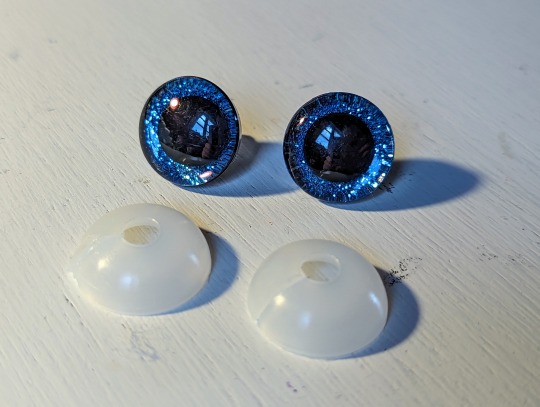
The washers on these eyes are particularly cup shaped, fitting around the back of the eye and holding the fabric tightly against them. Now that the eyes are removed, this has left imprints on the fur!
Plenty of brushing and rumfling will help to fix the creased and flattened areas of fur, and wetting the fur or gently steaming over a hot cup of water should help too. It might take a little time!
(Also, I did make a little cut in the cheek while removing a washer, oops! No worries, that can be stitched up.)
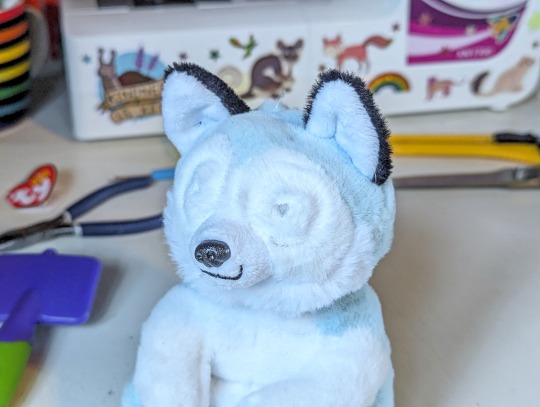
Now we can try on a few new eye styles! Restuff the head for now so you can see how they’ll look.
I have a few sizes of solid black, from teeny dots to absolute tbh creature…
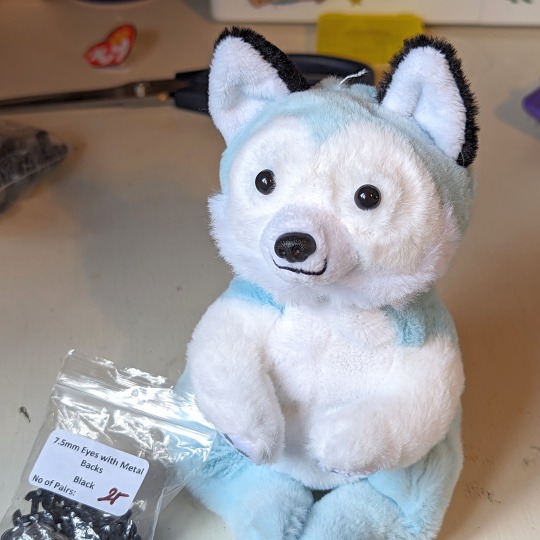

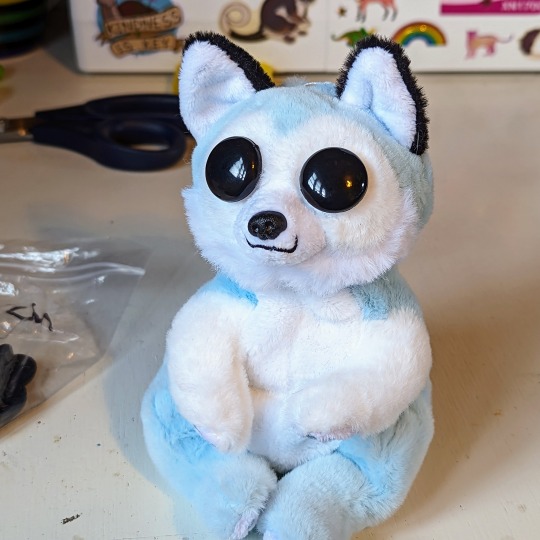
These blue eyes were a little scary… no thanks!

I even have some glittery ones like the original, but smaller! Pretty nice actually!

And even some googly eyes hehehe!

But my favourite eyes were some basic 9mm black ones! They are placed a little funny here, but the position will change a little bit…

The holes left by the original eyes were very big, so a couple of stitches are needed on each one to tighten them up to fit the new eyes. I stitched the top outer corners, to move the holes down and inwards a bit. If you wanted, you could even sew them closed completely and make new eye holes elsewhere!
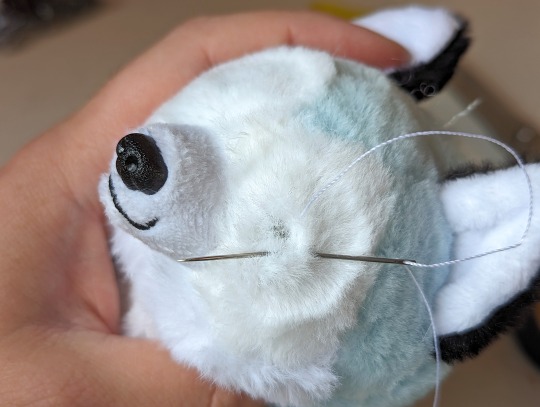
Unstuff again and pop those new eyes in!
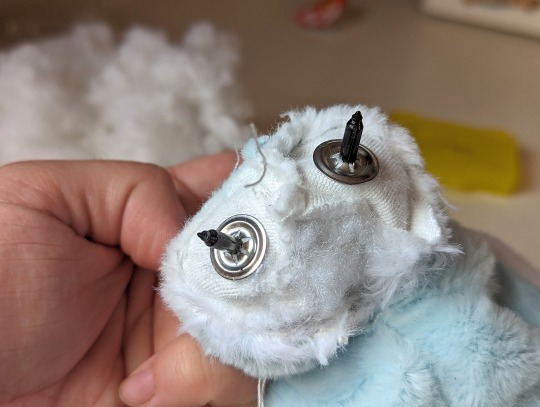
Restuff! You might actually need to add a little extra stuffing, as the fabric not being so pulled around the eyes any more will mean it is a little ‘baggier’.
Then sew the head closed again and that’s about it! The fur is still a little creased around mine, but I’ll keep working at it and it should become less visible.
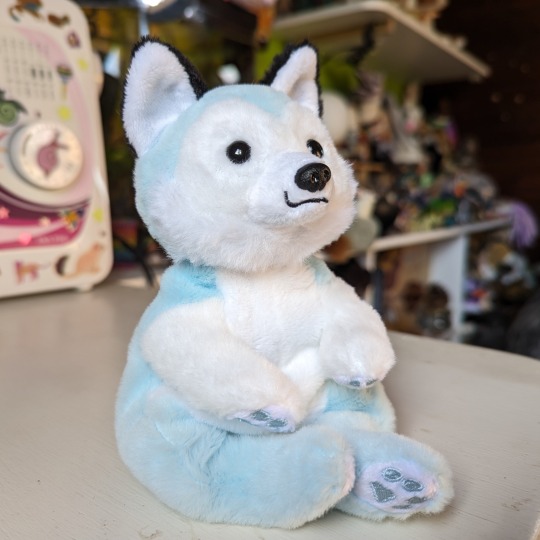
To add a tiny bit more shape to the big round head, I also did a touch of threadsculpting. I ran a thread from the corner of each eye to below the chin and back, just pulling the eyes in a tad more. You might decide you don’t need this!
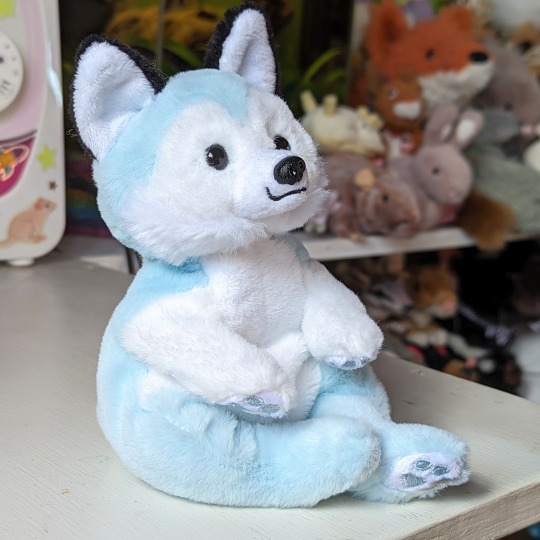
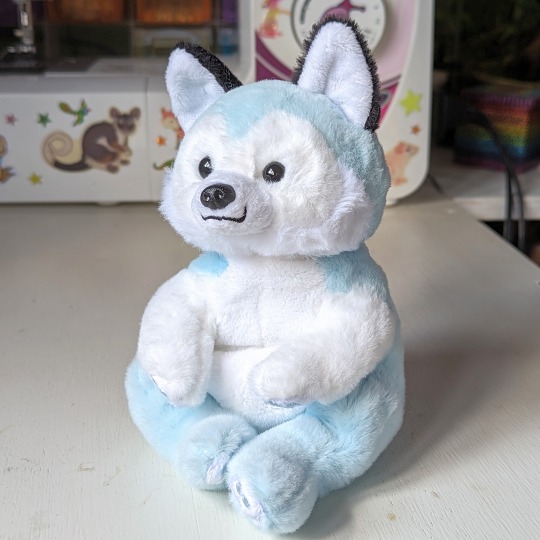
And there we go! Hope you’ll try it yourself!
13K notes
·
View notes
Text
My small addition to the "show don't tell" advice of storytelling is that in my opinion it's okay to use writing pitfalls like "Telling" the audience something if you intend to Also demonstrate ("show") it in the story.
For example "This is a story about a very grumpy guy." (que your main character road raging) (inciting incident happens and your protagonist reacts grumpily to it). Like it's not an inherent flaw depending on how you execute it AND even more importantly, the tone of your story. If your story is quippy, self aware, self narrating or various flavors of humor or self observant, it's okay to Just Tell the audience things. Not all things, but it can work for comedic effect or for exploring character observation and psychology, or doing a commentary on something. Works especially well if your narrator is actually a character within the story (ie. Person recalling events to someone)
ALSO importantly, you can use "Telling" for subverting expectations which can work towards either humor Or discomfort brilliantly.
"This is a story about a very grumpy guy" (que main character reacting completely normally to an event) (main character's reactions are treated as somehow overtly absurd and exaggerated by other characters despite them being very tame and reasonable). See what I mean?
It's okay to tell some things:
- if it serves the tone of your story
- if you ALSO show
- if it's funny
- if it's existentially horrifying
- if it serves towards an unreliable narrator
- if it makes the story interesting
- if it's not the point of the story to "show" some particular thing at all
I know people are gonna interpret the "Show don't tell" advice many different ways, so I wanted to add my two cents to it. I have way more to say, but here's my take in defence of "Telling". I believe in art and writing there's a time and place for any kind of narrative tools if you work with them well enough and know what you're doing.
#Mod talks#Writing advice#Meta#Storytelling#Show don't tell#Writing#Writblr#creative writing#Tropes#story tropes#Writing tropes
200 notes
·
View notes
Note
questioning aro culture is not knowing if your disconnect from romance is due to trauma, autism or actually being aro…
honestly, it doesn't matter "where" it comes from: the community and label are for those who find it useful. even if it's temporary, even if you may have experienced or been better able to label romantic attraction if you were neurotypical and less traumatized, if aromanticism is helpful for you - you are part of our community for as long as you'd like to be.
#aro culture is#aro#aromantic#actually aro#actually aromantic#ask#mod rust#questioning aro culture#advice#am i aro
142 notes
·
View notes
Note
How do I call characters who were born as identical twins but one of them is non-binary but has not transitioned medically. Are they still 'identical'? One is 3 inches shorter than the other, one wears glasses one is muscular the other average, they also have wildly different clothing/hairstyles so there's never actually a misunderstanding. But yeah if they were cis you'd still call such identical even though they look so different but not sure about if one was non-binary.
"Identical" in terms of twins refers to the specific genetic phenomenon - like how they came to be twins. It's not really a gender thing.
Identical twins also don't always "look" identical. Sometimes non-identical twins also "look" identical but they aren't, scientifically speaking.
The specifics of twin genetics aren't really in the purview of this blog, but I will say I recommend maybe doing more research on this topic in general if you're planning to represent characters who are twins. Twins can also be half identical, and there can also be triplets where two are identical and the third isn't. There are also twins who grow up thinking they are identical and then get genetic testing done to find out they aren't.
All that said, I think most people will wonder how your characters got to be 3 inches apart in height if they are truly identical and neither has taken any hormones.
mod nat
102 notes
·
View notes
Note
HOW DO YOU TELL IF YOU HAVE A CRUSH ON SOMEONE, HOW DOES ROMANTIC FEELINGS DIFFERENTIATE FROM PLATONIC I THINK IM GONNA EXPLODE
i have felt both towards my boyfriend at different times so in my experience platonic attraction is a feeling that is much less anxious. before I got romantic feelings, I wanted to spend time with him and was a little disappointed when I couldn't, but that was about it. once I developed romantic attraction to him, I found myself attached to him like I wasn't before. I was anxious that if I said something he might reject me.
neither of these experiences are mutually exclusive of the other, but this is my experience.
#aromantic#aro#official aromantic post#official aro post#mod cale#ask#anonymous#june 15 2025#advice#queuepid was wrong
46 notes
·
View notes
Text
Not a poll but i need help chat
I have a trip in 3 days and fucked up my haircut aka cut bangs too short are there any tips to fix it because i have a huge aah forehead without the bangs and with the bangs i look like a mediaeval peasant aaaaaaa
51 notes
·
View notes
Text
hey y’all, a reminder:
please please please SIZE UP when you order a binder, unless you are literally the smallest measurement for the given size. i just made this mistake, i was the max measurement for the size and i thought it was fine and now i have the binder and it is tight and uncomfortable. also if you are reading this how long have you had your binder on? and drink some water!!
love,
arlo
140 notes
·
View notes
Note
If I wanted to start a zine, how would I go about doing so?
Hi! Thank you for giving me the opportunity to infodump about zines, this might get a little long ;) There are many different ways to make a zine, but the way we often see in fandom right now follows this structure:
Interest check: Explain what your zine is about, have people hear about it, and collect information on the kind of things people would want to see or make in your zine (usually through a google form, but it can also be a tumblr poll or anything else like that)
Mod Applications: Assemble your team! Social media mod, formatting mod, art/writing mod, etc. This is usually done through a google form. Honestly, when selecting your mods, having people you *trust* is what's most important. So while having someone with experience is good, have people you know you can rely on, like your friends, even if they don't have previous experience.
Contributor Applications: Also done through a google form; get people who want to create through the zine to submit examples of their work so you can choose which ones get in the zine.
Creation Period: All the contributors you selected make their pieces! And then you, or the person in charge, assemble everything together.
Release: If you publish the zine online for free, you can have the pdf available to download on itch.io. If you want to print it and sell it, that's a whole different subject that I'm not very knowledgeable about tbh.
The most important part when your zine is starting out is to get the word out there! Make a tumblr blog specifically for the zine, make lots of posts reminding people of when the interest check/mod applications/contributor applications are opening or closing, when you have contributors make posts to introduce them, etc. I find that having visuals accompanying your posts helps a lot, especially if you have a strong visual identity already, it helps people remember your zine. You can also invite guest contributors; people who you invite into the zine as opposed to having them apply (usually creators you like), so they can help share contributors applications.
I also have a lot to say about things to watch out for when making the zine, mostly time management and participant wrangling, but this is supposed to answer the question "how to get started" so I don't want it to get too long lmao. Just make sure to give yourself enough time to do things like looking through form answers or setting up things. Deadlines are great to keep things moving but remember they are self imposed, so don't make it impossible for yourself!
In terms of resources to help you out, I can redirect you towards the Hermit-a-day streamathon panel both mods of this blog were on to discuss everything that goes into making a zine. I know that on the Artbook to Zinethologies streamathon they discussed zine-making, although since I haven't watched it I don't know into how much detail they go.
And don't be afraid to reach out to other zine mods! We're usually more than happy to chat and give advice (case in point here), sometimes even get roped into modding another zine ;) Beware, it becomes an addiction.
HOWEVER with all that said there are many different ways to run a zine!! You can decide to keep it smaller scale and exclusive to friends or people you know, you can skip the applications and have it open to everyone, have people just send in finished pieces, ... the world is your oyster, really. I recommend to go check out @mcyt-flashzine, which helps people run their own mini-zines!
I hope all this all helps, and good luck on your zine making journey! Make sure to tag us in your posts ;)
#asks#mod a10#always love to get to talk about zines!!#and of course if anyone reading has any other advice to give anon share in the replies :D
48 notes
·
View notes
Text
Where to Start Your Research When Writing a Disabled Character
[large text: Where to Start Your Research When Writing a Disabled Character]
So you have decided that you want to make a disabled character! Awesome. But what's next? What information should you decide on at the early phrase of making the character?
This post will only talk about the disability part of the character creation process. Obviously, a disabled character needs a personality, interests, and backstory as every other one. But by including their disability early in the process, you can actually get it to have a deeper effect on the character - disability shouldn't be their whole life, but it should impact it. That's what disabilities do.
If you don't know what disability you would want to give them in the first place;
[large text: If you don't know what disability you would want to give them in the first place;]
Start broad. Is it sensory, mobility related, cognitive, developmental, autoimmune, neurodegenerative; maybe multiple of these, or maybe something else completely? Pick one and see what disabilities it encompasses; see if anything works for your character. Or...
If you have a specific symptom or aid in mind, see what could cause them. Don't assume or guess; not every wheelchair user is vaguely paralyzed below the waist with no other symptoms, not everyone with extensive scarring got it via physical trauma. Or...
Consider which disabilities are common in real life. Cerebral palsy, muscular dystrophy, stroke, cataracts, diabetes, intellectual disability, neuropathy, multiple sclerosis, epilepsy, thyroid disorders, autism, dwarfism, arthritis, cancers, brain damage, just to name a few.
Decide what specific type of condition they will have. If you're thinking about them having albinism, will it be ocular, oculocutaneous, or one of the rare syndrome-types? If you want to give them spinal muscular atrophy, which of the many possible onsets will they have? If they have Ehlers-Danlos Syndrome, which one out of the 13 different types do they have? Is their amputation below, or above the knee (it's a major difference)? Not all conditions will have subtypes, but it's worth looking into to not be surprised later. This will help you with further research.
If you're really struggling with figuring out what exact disability would make sense for your character, you can send an ask. Just make sure that you have tried the above and put actual specifics in your ask to give us something to work with. You can also check out our "disabled character ideas" tag.
Here are some ideas for a character using crutches.
Here are some ideas for a character with a facial difference (obligatory link: what is a facial difference?).
If you already know what disability your character is going to have;
[large text: If you already know what disability your character is going to have;]
Start by reading about the onset and cause of the condition. It could be acquired, congenital, progressive, potentially multiple of these. They could be caused by an illness, trauma, or something else entirely. Is your character a congenital amputee, or is it acquired? If acquired - how recently? Has it been a week, or 10 years? What caused them to become disabled - did they have meningitis, or was it an accident? Again, check what your options are - there are going to be more diverse than you expect.
Read about the symptoms. Do not assume or guess what they are. You will almost definitely discover something new. Example: a lot of people making a character with albinism don't realize that it has other symptoms than just lack of melanin, like nystagmus, visual impairment, and photophobia. Decide what your character experiences, to what degree, how frequently, and what do they do (or don't do) to deal with it.
Don't give your character only the most "acceptable" symptoms of their disability and ignore everything else. Example: many writers will omit the topic of incontinence in their para- and tetraplegic characters, even though it's extremely common. Don't shy away from aspects of disability that aren't romanticized.
Don't just... make them abled "because magic". If they're Deaf, don't give them some ability that will make them into an essentially hearing person. Don't give your blind character some "cheat" so that they can see, give them a cane. Don't give an amputee prosthetics that work better than meat limbs. To have a disabled character you need to have a character that's actually disabled. There's no way around it.
Think about complications your character could experience within the story. If your character wears their prosthetic a lot, they might start to experience skin breakdown or pain. Someone who uses a wheelchair a lot has a risk of pressure sores. Glowing and Flickering Fantasy Item might cause problems for someone photophobic or photosensitive. What do they do when that happens, or how do they prevent that from happening?
Look out for comorbidities. It's rare for disabled people to only have one medical condition and nothing else. Disabilities like to show up in pairs. Or dozens.
If relevant, consider mobility aids, assistive devices, and disability aids. Wheelchairs, canes, rollators, braces, AAC, walkers, nasal cannulas, crutches, white canes, feeding tubes, braillers, ostomy bags, insulin pumps, service dogs, trach tubes, hearing aids, orthoses, splints... the list is basically endless, and there's a lot of everyday things that might count as a disability aid as well - even just a hat could be one for someone whose disability requires them to stay out of the sun. Make sure that it's actually based on symptoms, not just your assumptions - most blind people don't wear sunglasses, not all people with SCI use a wheelchair, upper limb prosthetics aren't nearly as useful as you think. Decide which ones your character could have, how often they would use them, and if they switch between different aids.
Basically all of the above aids will have subtypes or variants. There is a lot of options. Does your character use an active manual wheelchair, a powerchair, or a generic hospital wheelchair? Are they using high-, or low-tech AAC? What would be available to them? Does it change over the course of their story, or their life in general?
If relevant, think about what treatment your character might receive. Do they need medication? Physical therapy? Occupational therapy? Orientation and mobility training? Speech therapy? Do they have access to it, and why or why not?
What is your character's support system? Do they have a carer; if yes, then what do they help your character with and what kind of relationship do they have? Is your character happy about it or not at all?
How did their life change after becoming disabled? If your character goes from being an extreme athlete to suddenly being a full-time wheelchair user, it will have an effect - are they going to stop doing sports at all, are they going to just do extreme wheelchair sports now, or are they going to try out wheelchair table tennis instead? Do they know and respect their new limitations? Did they have to get a different job or had to make their house accessible? Do they have support in this transition, or are they on their own - do they wish they had that support?
What about *other* characters? Your character isn't going to be the only disabled person in existence. Do they know other disabled people? Do they have a community? If your character manages their disability with something that's only available to them, what about all the other people with the same disability?
What is the society that your character lives in like? Is the architecture accessible? How do they treat disabled people? Are abled characters knowledgeable about disabilities? How many people speak the local sign language(s)? Are accessible bathrooms common, or does your character have to go home every few hours? Is there access to prosthetists and ocularists, or what do they do when their prosthetic leg or eye requires the routine check-up?
Know the tropes. If a burn survivor character is an evil mask-wearer, if a powerchair user is a constantly rude and ungrateful to everyone villain, if an amputee is a genius mechanic who fixes their own prosthetics, you have A Trope. Not all tropes are made equal; some are actively harmful to real people, while others are just annoying or boring by the nature of having been done to death. During the character creation process, research what tropes might apply and just try to trace your logic. Does your blind character see the future because it's a common superpower in their world, or are you doing the ancient "Blind Seer" trope?
Remember, that not all of the above questions will come up in your writing, but to know which ones won't you need to know the answers to them first. Even if you don't decide to explicitly name your character's condition, you will be aware of what they might function like. You will be able to add more depth to your character if you decide that they have T6 spina bifida, rather than if you made them into an ambiguous wheelchair user with ambiguous symptoms and ambiguous needs. Embrace research as part of your process and your characters will be better representation, sure, but they will also make more sense and seem more like actual people; same with the world that they are a part of.
This post exists to help you establish the basics of your character's disability so that you can do research on your own and answer some of the most common ("what are symptoms of x?") questions by yourself. If you have these things already established, it will also be easier for us to answer any possible questions you might have - e.g. "what would a character with complete high-level paraplegia do in a world where the modern kind of wheelchair has not been invented yet?" is more concise than just "how do I write a character with paralysis?" - I think it's more helpful for askers as well; a vague answer won't be of much help.
I hope that this post is helpful,
mod Sasza
#mod sasza#writing reference#writing advice#writing resources#writeblr#writing disabled characters#writing resource#long post#writing tips#writing guide
4K notes
·
View notes
Note

Have this plump c00lkidd sir- *dramatic jumps out the window.*

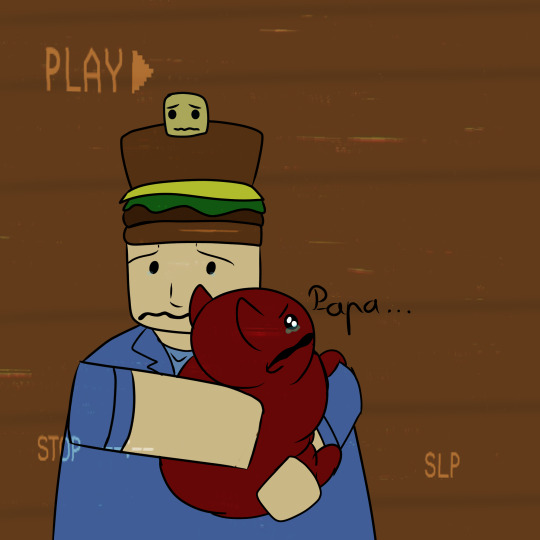
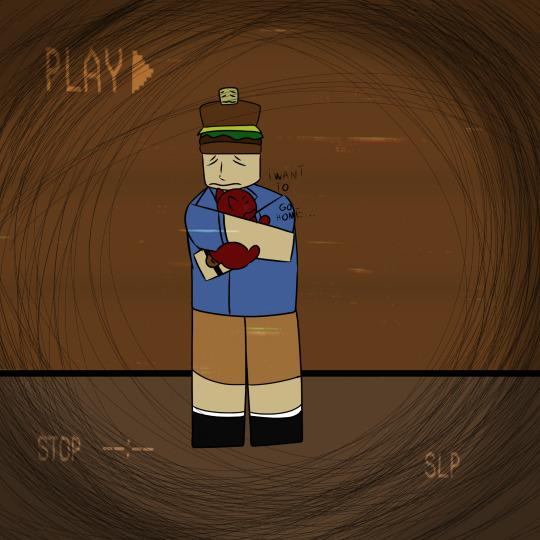
#mod-ghosty#007n7 forsaken#forsaken 007n7#forsaken ask blog#forsaken#forsaken roblox#fatherly advice [answered letters]#I'm sorry my dear boy [C00lkidd mention]
36 notes
·
View notes
Text
Hi hi btw (gets close to mic) having drawings you don't like and making things you end up hating? TOTALLY okay. Normal! All fine. They happen and that's okay and normal. Don't get distressed about it you gotta analyze that shit you gotta cover parts of the drawing and think "Does it look better like this" and if it DOES then you know what went wrong. Or at least some part of it. Get a new perspective try different lines try different shapes. Make it a learning experience. But it's okay to just not be happy with something you make. You don't need to feel distraught by it it's okay. Feeds you a sugar cube and pets you. It's okay. Doesn't mean you won't make things you love later
#Mod talks#Art advice#Art help#Artblr#art inspiration#Art motivation#Artist motivation#artist inspiration
251 notes
·
View notes
Note
Hi!! I'm really having a problem and I need your advice 😭
I'm on the aroace spec and living with homophobic family members. My aunt is suspicious about me being lesbian/bi because of 'how I act'. There's a high chance that she's clueless about asexuality and aromanticism hence I can't come out to her about it. Maybe she's aphobic too 😥
What do I do? :')
First of all I'd just like to clarify that the mod answering this has no experience in a situation like this, and is not a professional (none of us are), so I'm so sorry to say I can't give you advice without fear of accidentally making your situation worse.
Having said that, if there's anyone out there who has more credible advice, please jump in!
And anon, I'm so sorry you're in that situation and I couldn't help, I hope someone is able to give you some better advice.
#mod ozzie#our arospec experience#arospec#aro#aromantic#queer#lgbtqia+#aro pride#tw homophobia#tw arophobia#tw toxic relationship#advice
25 notes
·
View notes
Note
Question. Is it allophobic if my sister finds a boy friend and I get pissed because all of a sudden it's about the dude? The dude above us all, choosing the dude above everyone else. Like why is this normal and why am I considered deranged for questioning this weird illogical hierarchy. People say I'm bitter because I can't find a one true significant other, not knowing that I'm not even interested in the slightest.
which is why I ask is it a little too far to be pissed when a family/friend kind of person to you chooses their significant other all the time?
Allophobia does not exist on a cultural level. I am not humoring this term that I've only seen used in bad faith; I will instead address the response to a person you care for suddenly spending more time with others because they entered a new romantic relationship.
To begin with, it is okay to feel how you feel, even if you would rather not feel it for some reason or another. You are allowed to feel angry, upset, betrayed, and all sorts of things for any reason. But you must own this emotion; it is how you feel, and you cannot use this to determine intent or blame.
When you feel upset, it's important to practice letting yourself name your emotion. Look up a feelings wheel if you need some ideas. Acknowledge that yes, you are feeling this way. Then, locate how it feels in your body. Consider areas of tension, temperature, movement or stillness. Just acknowledge it. You don't have to do anything about that if you don't want to. Just think about it.
Then comes the hardest part, personally.
Is that emotion telling you something? Does it tell you that you'd like a more robust social circle to lean on when someone has another part of their life they are focusing their energy on? Could you redirect your energy into something? Is this emotion about that specific situation, or a broader theme in your life? Whatever it is, try to address that, thank your body for telling you this, and let the emotion go. This is a practice; you need to let yourself feel, learn to trust that you will address the root cause, and that you can let it go.
It can be really helpful to contextualize this from the perspective of the other individual. With new romantic partners, the polyamorous community has a term called New Relationship Energy (NRE) and talks about how hard it can be to navigate within a polyam relationship, when their partners gain new partners. People get excited to dive into their new relationship. If you've ever gotten into a new media and absolutely immersed yourself, or a new craft, or anything, it's very similar. New things can be exciting!
I'm very certain that your sister, and the vast majority of people getting into a new relationship and suddenly paying less attention to their loved ones, do not mean to harm you. They may or may not be applying an hierarchy. They're often excited and enjoying the new experiences. You can still feel hurt, and you can talk with them openly about this without blaming them. "I feel upset because we haven't played Animal Crossing together in a month. Could we please commit to a night together? I miss you."
228 notes
·
View notes
Note
Something that seems to come up in my work a bunch is characters who get unrequited feelings for asexual (sometimes aroace) characters. Sometimes the character with the feelings ends up feeling guilty about how they feel, especially if the characters are close.
To be clear, I never portray the asexual characters as bad or at fault for their lack of reciprocation. Ever. And the character w/ the feelings isn't bad either for how they feel.
I just want to know if there's any a-spec friendly advice for writing this sort of scenario and keeping it respectful.
This is just a normal experience of rejection. Having a crush on someone just kind of happens sometimes, and not returning feelings also just kind of happens sometimes. I feel like the best advice I could give on this is to just sort of appreciate and respect the feelings of all involved, if you want to depict the characters as people with any bare minimum sense of respecting consent and boundaries anyway.
Followers, feel free to add any of your thoughts/experiences if you have any!
#mod nat#asexuality#asexual characters#writeblr#writing advice#relationships#writing#writers#writers on tumblr#writing community#creative writing#asexual character#asexual
49 notes
·
View notes